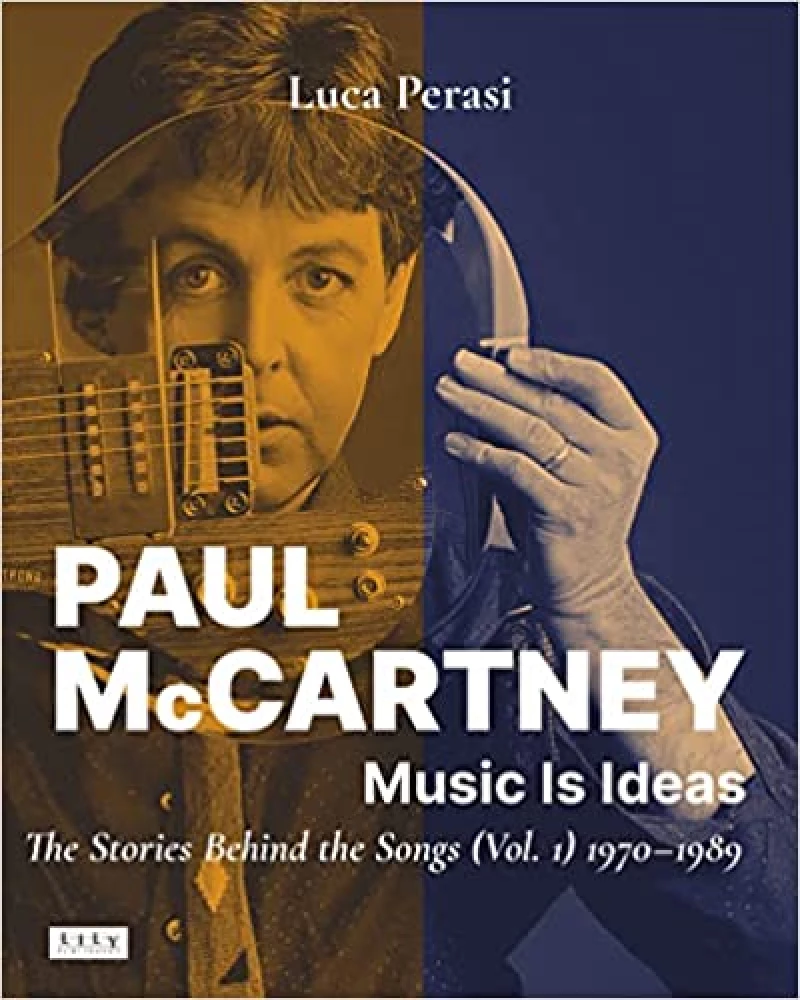Luca Perasi - Paul McCartney: Music Is Ideas. The Stories Behind the Songs (Vol. 1) 1970-1989
by Eoghan Lyng
published: 26 / 5 / 2023

intro
Eoghan Lyng profiles Italian author Luca Perasi's impeccably researched book on the stories behind Paul McCartney's songs.
With this impeccably researched tome, Italian author Luca Perasi brings us to a type of Ulyssean moment. By the time readers have reached the end of the work, we feel as unreservedly satisfied as was Molly Bloom in detailing the exploits of two wholly different lovers. ‘Paul McCartney: Music Is Ideas. The Stories Behind the Songs (Vol. 1) 1970-1989’ is less focused on the sex - although the bassist, free from the shackles The Beatles laid on him, was happy to sing about coitus - but similarly celebrates the triumphs of a longstanding member of the English working class. This is Perasi's follow-up to ‘Paul McCartney: Recording Sessions’ (2013), and although it's too early to say whether or not he's improved on the former, it's safe to say he's matched it. This volume follows a more compact timeframe, but focuses on what was arguably the bassist's most creatively fertile period as a solo artist. (Following the tour to promote 1989’s ‘Flowers In The Dirt’, McCartney focused his energies on saluting The Beatles catalogue, and he's spent the last thirty or so years performing as a nostalgia artist, save for a Rihanna song or two.) The book is sprawling, capturing the bassist at his most frenzied and adventurous, whether it was admonishing his country's government for their senseless acts of violence ('Give Ireland Back To The Irish'), or formulating a paradigm from which white artists could plug in their instruments and jive ('Silly Love Songs'). It may be fifty-three years since The Beatles broke up, but McCartney - who harboured a prolificity that was impossible even for his bandmates to match - has rarely slowed down in the decades since. Much has changed in the intervening years, although McCartney did his best to keep up with the demands of the times. Remarkably, one of his most prescient tracks ('What's That You're Doing') was actually the work of happenstance and good timing: in one of the many interviews he conducted for the book, Perasi discovered that Stevie Wonder - who sang on the track, and played keyboards - improvised many of the lyrics that wound up on the finished piece. McCartney's modus operandi - if you can call it that - was to follow his instincts, although many of his strongest pieces were written in tandem with Wings guitarist Denny Laine. This was no coincidence. The Beatles were founded on the partnership McCartney established with John Lennon, causing him to spend the remainder of his career, vocation and life in search of a new partner. With Laine, McCartney composed 'Mull of Kintyre', an autumnal ballad that commemorated the Scottish scenery, bolstered by an Irish melody that celebrated his maternal homeland. (Laine, in an interview with this reviewer, also admitted that he had Irish blood, through his father.) This book is not an overview of the man’s home life. We are not here to get verbally dexterous portraits of a musician who almost singlehandedly re-created 20th century pop. When Perasi unleashes his inner poet, his descriptions are quick and cheerful, before returning to the work in question. The book is dense and scintillatingly produced, overlooking a catalogue of work that is almost double in length that of the Beatles’. Yet it zips along with the urgency of an infectious melody that could easily have wound up on ‘Red Rose Speedway’ or ‘Press To Play’. McCartney's audience did not rush in to welcome the bassist’s solo career with open arms, but once they grew used to his esoteric trajectory they remained devoted for life. Perasi must be fearless to undertake such an ambitious project, and the finished work rivals James Joyce both for its word count and its length. Whether or not he'll accept the comparison remains to be seen, but fittingly he opens the book with a quote from Leopold Mozart, questioning the validity of complexity in the world of popular form. Leopold basically summed McCartney up to the letter!
Band Links:-
https://en.wikipedia.org/wiki/Paul_McCartneyPlay in YouTube:-
most viewed articles
current edition
Carl Ewens - David Bowie 1964 to 1982 On Track: Every Album, Every SongBathers - Photoscapes 1
Colin Blunstone - Thalia Hall, Chicago, 16/7/2025
Visor Fest - Valencia, Spain, 26/9/2025...27/9/2025
Billie Eilish - O2 Arena, London, 10/7/2025
Bathers - Photoscapes 2
Sir Tim Rice - Interview
John McKay - Interview
Editorial - July 2025
Armory Show - Interview with Richard Jobson
previous editions
Heavenly - P.U.N.K. Girl EPTrudie Myerscough-Harris - Interview
Pixies - Ten Songs That Made Me Love...
Beautiful South - Ten Songs That Made Me Love...
Simon Heavisides - Destiny Stopped Screaming: The Life and Times of Adrian Borland
Oasis - Oasis, Earl's Court, London, 1995
Boomtown Rats - Ten Songs That Made Me Love....
Blues and Gospel Train - Manchester, 7th May 1964
Prolapse - Interview
Paul Nelson - Interview
most viewed reviews
current edition
Amy Macdonald - Is This What You've Been Waiting For?Sick Man of Europe - The Sick Man of Europe
Alice Cooper - The Revenge of Alice Cooper
Phew, Erika Kobayashi,, Dieter Moebius - Radium Girls
Lucy Spraggan - Other Sides of the Moon
Blueboy - 2
Cynthia Erivo - I Forgive You
Davey Woodward - Mumbo in the Jumbo
Lapsley - I'm a Hurricane, I'm a Woman In Love
Philip Jeays - Victoria
Pennyblackmusic Regular Contributors
Adrian Janes
Amanda J. Window
Andrew Twambley
Anthony Dhanendran
Benjamin Howarth
Cila Warncke
Daniel Cressey
Darren Aston
Dastardly
Dave Goodwin
Denzil Watson
Dominic B. Simpson
Eoghan Lyng
Fiona Hutchings
Harry Sherriff
Helen Tipping
Jamie Rowland
John Clarkson
Julie Cruickshank
Kimberly Bright
Lisa Torem
Maarten Schiethart